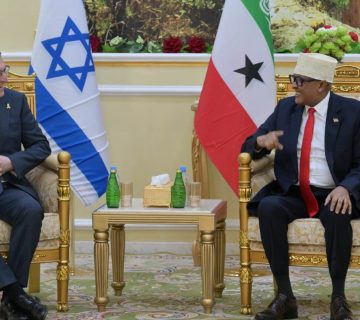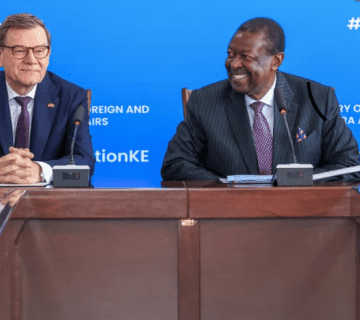Symposium Policy Brief: Climate Change, Migration, and Security in the Horn of Africa (Policy Briefs)
Central African Republic: The Impact of Conflict on Living Conditions
Central African Republic (CAR) ranks 188 out of 189 on the Human Development Index and it is estimated that approximately 71 per cent of the population is living below the poverty line. These statistics depict the tough living conditions which are largely a product of persistent coups and the civil war that broke out in 2012. In various ways, the 14 recognized armed groups have played a role towards the build-up of the five coups. Currently, the key actors of the conflict are six armed groups that are united to form the Coalition of Patriots for Change (CPC). The CPC fights those who are not party to its coalition, to gain control over territory and resources such as diamond and gold. Insecurity as a result of the same has made it difficult to establish and access basic services such as healthcare and education.
The level of insecurity has in turn contributed to the high poverty rate alongside the displacement of persons. The several attempts to restore peace have unfortunately been ineffective and expensive for the government and the international community, due to lack of political will. To improve living conditions, all actors involved in the peace process should intentionally work on pursuing sustainable peace.
Limited access to basic services
Bangui’s estimated population of 958,000, alongside residents from other prefectures, rely on the country’s only public hospital for treatment. Few private hospitals that mainly serve the wealthy are however within the region. Access to these few medical facilities in Bangui by locals from other prefectures has proved to be difficult mainly due to attacks by armed rebels. While the motive behind attacks on patients and medical facilities is unclear, the attacks on the mentioned group seem to be sporadic and unpredicted. According to a statement issued in 2021 by Medecins Sans Frontieres’s (MSF) deputy program manager, “Since December, moving around on the outskirts of major towns has been extremely difficult and dangerous due to checkpoints, robberies and attacks.” The statement was in response to attacks on motorbike riders delivering lifesaving drugs and transporting sick and wounded patients to hospital.
Despite the dire need for humanitarian intervention, most mandated organizations either suspend their operations or are not willing to be involved due to the security risks concerned. In the first quarter of this year, 43 incidents affecting humanitarian organizations there were recorded, with 11 aid workers injured. Last year, at least one incident per day was recorded, half of which were as a result of burglaries, robberies and intrusions. Withdrawal and reduced involvement of humanitarian organizations as a resulted of the events has negatively impacted the health sector which has an average of 0.06 doctors per 1000 patients.
According to United Nations Children’s Fund (UNICEF), one out of every two children was affected by the closure of schools in 11 out of 16 prefectures a result of increased violence in 2021. Learning disruption was largely a result of offensives launched by the CPC, who were disputing the re-election of President Touadera. A report by Human Rights Watch titled No Class When Armed Groups Use Schools in the Central African Republic, revealed numerous uses of classrooms as bases by the armed groups. Looting and destruction of school property by the armed groups have led to further deterioration of the country’s already poor learning infrastructure.
The security situation has consequently led to massive displacements including to Bangui, where the number of private schools has increased, representing about half of the basic education schools. The increase in the number of learning institutions consequently migrants to the Western region clearly shows that insecurity prevents the thriving of education in other regions.
Effect on livelihoods
The low literacy rate of 37 per cent has forced most people to pursue livelihoods that do not require formal education. About 75 per cent of Central Africans, particularly women, depend on agriculture for their livelihood. In the early stages of the civil war, widespread looting of crops and livestock largely eroded the people’s purchasing power, leading to increased poverty levels. Recently, growth in the sector has been hampered by lack of modernization and investment, the latter being directly attributed to by the conflict. In addition, displacement when violence erupts often forces families to abandon their farms, a move that further exacerbates the poverty level.
Besides small-scale farming, insecurity has also taken a heavy toll on start-up businesses. Different rebel groups controlling different territory have checkpoints where they tax goods in transit, leading to price inflation. A case in point is the Obo region where beer would retail for four times its price after being taxed while passing through the checkpoints. An average businessman outside Bangui would therefore have to part with an extra cost so as to guarantee the safe arrival of goods in transit. Through the named activities, rebel groups, therefore, raise the cost of doing business.
Failed Peace Accord
Several peace agreements have been signed but none has been effective mainly due to partial implementation. The latter can be credited to the lack of political will during the peace process. This is partly evident through the actions of the actor’s party to the peace process, who defect to rebel groups once they lose power. This raises the question of whether they were committed to peace in the first place. Former President Bozize who signed two accords with rebels, was quick to join the CPC in 2020 once his presidential bid was revoked by the court in 2019. The same is the case for Maxime Moxom, a former Minister for Disarmament, who defected from the government to join the CPC despite taking part in the signing of the Khartoum Accord in 2019. Coups have often proven to have a higher success rate of installing leaders to power as compared to elections, therefore making most actors opt for the same, preferably through rebel groups.
In a bid to restore full state autonomy, President Touadera welcomed the Wagner group, a private military company from Russia. Through the aid of the named mercenaries, the government has been able to re-establish state control, mainly in the western region. Rebels however retreated to other regions where they have gained a stronger foothold. In return for their efforts, the Russians receive concessions for minerals that the country desperately needs for economic growth.
Despite the improved levels of stability brought about by the Russians, the government needs to embark on working on a sustainable peace accord. The actors involved should be intentional and should build on the experience of previous failures. Should the process be successful, the government will be able to regain autonomy in all regions, thereby providing the much-needed basic services to its citizens. This will go a long way in improving the living conditions in the country.
Jeremy Oronje is a Research Intern at the HORN Institute
Photo: Central African army soldiers, Russian mercenaries, and UN peacekeepers at a meeting between President Touadéra and members of his MCU party, in Bangui, on 27 December, 2020 (Photo Credit: Adrienne Surprenant/TNH/The New Humanitarian)
The contents of this article are copyright of © The HORN Institute 2022. All rights reserved. Any redistribution or reproduction of part or all of the contents in any form and for whatever reason is prohibited. You may use the content of this article for personal reasons, but acknowledge the author and cite the website as sources of the material.



